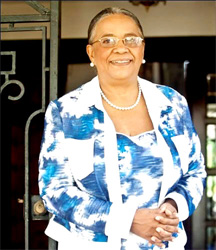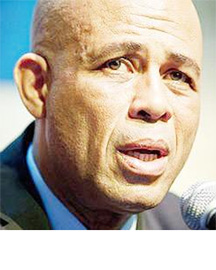WASHINGTON (Reuters) – The United States yesterday urged Haiti’s exiled former President Jean-Bertrand Aristide to delay his return until after Haiti’s March 20 run-off presidential election.

Responding to reports of Aristide’s imminent return to Haiti, State Department spokesman Mark Toner said it was up to Port-au-Prince to decide whether to permit the return of its former leader who has lived in exile in South Africa since his 2004 ouster.
“Former President Aristide has chosen to remain outside of Haiti for seven years,” said Toner. “To return this week could only be seen as a conscious choice to impact Haiti’s elections.”
“We would urge former President Aristide to delay his return until after the electoral process has concluded, to permit the Haitian people to cast their ballots in a peaceful atmosphere,” he said, adding that a return before the election could “potentially be destabilizing to the political process.”
Toner said the United States was also urging the South African government to urge Aristide to delay his return until after the election.
A spokeswoman for Aristide said on Friday that the former president would return to Haiti “in a few days” but said it was unrelated to the upcoming election.
Election officials have barred Aristide’s party from running a candidate in the election, which was tainted by allegations of widespread fraud during November’s first round of voting.
Most Haitians refer to popular singer and presidential contender Michel Martelly as simply “Mickey”. His rival in a March 20 run-off election, respected former first lady Mirlande Manigat, is granted the more formal sobriquet of “Madame Manigat”.
The contrast between the brash entertainer and the soft-spoken opposition matriarch means the final stage of what has been a tumultuous presidential campaign in the Western Hemisphere’s poorest state will be as much about competing personalities and style as policy proposals.

Although two decades separate 70-year-old grandmother Manigat from her younger rival, both are seen by analysts as right-of-center candidates who share many similar views on how to put the earthquake- and cholera-ravaged Caribbean nation on the path of recovery.
The debate over experience is what most divides the two candidates, who were eventually declared the two front-runners from a chaotic, inconclusive Nov. 28 first round vote that was fraught with vote-rigging allegations and unrest.
Manigat was the top first round vote-getter, but did not gain enough to win outright. She would be Haiti’s first elected female president if she wins the run-off on Sunday.
Martelly, 50, is a political neophyte who was propelled into the run-off by a revision of the vote tally from the first round. He says he offers the fresh start that Haiti needs.
“Sweet Mickey”, as he is widely known, says the post-quake recovery requires an energetic, courageous leader who can make a clean break with the bad habits of corruption, mismanagement and violence that have plagued Haiti’s government for decades.
A star of Haiti’s catchy Kompa dance music, the charismatic shaven-headed Martelly projects himself as a “man of the people” in tune with a popular clamor for jobs, affordable food, clean water and housing, healthcare and education.

